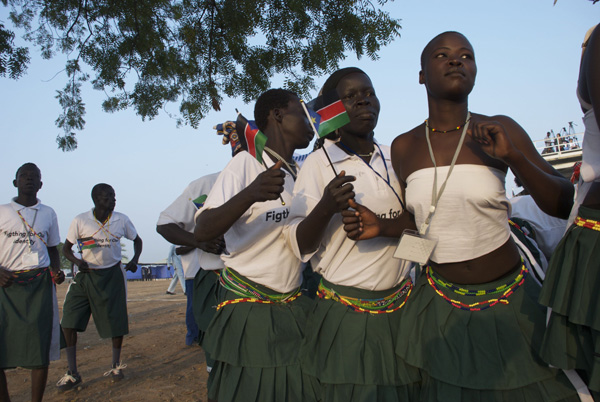
Media coverage of Sudan over the past several weeks has focused to a great extent on the intensification of fighting between the Sudan Armed Forces, or SAF, and the Sudan People’s Liberation Army, or SPLA, which threatens to plunge the former civil war foes into an international armed conflict. Largely absent from recent coverage has been the passage of the April 8 deadline after which ethnic southerners in Sudan—numbered as many as 700,000—were required to register as foreigners in Sudan or move back to South Sudan, where they are citizens.
A lack of identification documents and available transportation, coupled with increased insecurity along the North-South border and conflict in the border states of South Kordofan and Blue Nile, means that today a large number of southerners remain in Sudan without adequate documentation and amid growing anti-southern sentiment.
On April 9, authorities at Khartoum’s airport moved the gates from which flights to Juba depart from the domestic terminal to the international terminal and required passengers to present passports. With the vast majority of passengers without passports and therefore unable to board, airlines subsequently suspended all flights between the two capital cities. Enough has learned that, last week, South Sudan’s Ministry of Interior dispatched a team of nationality officers to provide emergency travel documents to those in Sudan who wish to return to South Sudan. There are apparently plans as well to issue further identification documents and passports. However, the timeline for this process remains unclear.
At the same time, Enough has learned from a source in Khartoum that the government of Sudan has given South Sudanese a month to register as foreigners. The government has not, however, made clear where this registration will take place. Registration is a requirement for all foreigners present in Sudan. While details surrounding the registration process remain opaque, without any identification documents, it will likely not be possible for southerners who wish to remain in Sudan to register. UNHCR is currently providing financial and technical assistance to South Sudan to assist in documenting southern nationals in Sudan.
While efforts undertaken by South Sudan, with the assistance of international organizations, to issue travel and identification documents, albeit late, is a step in the right direction, more should be done in the immediate term to ensure that South Sudanese in Sudan, as well as elsewhere outside of South Sudan, receive necessary identification documents to facilitate travel and/or registration. As well, the government of Sudan should be encouraged to immediately publicly disseminate information about how southerners who wish to remain in the North can register, including what documentation is necessary to complete the registration process.
Finally, both Sudan and South Sudan, with appropriate support from the international community, must make every effort to assist in safely and securely relocating southerners who desire to return to South Sudan. Such returns are, of course, complicated by increased violence in South Kordofan and Blue Nile states, as well as along the North-South border. In light of increasing anti-southern sentiments within Khartoum, coupled with reports, which Enough has received in recent days, indicating that southerners have been arrested in the capital, underscore the susceptibility of southerners in Sudan today. Without proper identification documents or recourse to return South if desired, these southerners could face growing insecurity in the coming days and weeks. The governments of Sudan and South Sudan, with the assistance of the international community, must remain vigilant against anti-South Sudanese violence and take steps immediately to ensure the protection of this vulnerable population.
Photo: Women wave South Sudan flags at the independence ceremony in Juba last July (Enough / Laura Heaton)

